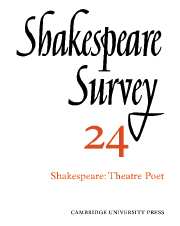Book contents
- Frontmatter
- Hearing Shakespeare: Sound and Meaning in ‘Antony and Cleopatra’
- ‘More Pregnantly Than Words’: Some Uses and Limitations of Visual Symbolism
- Shakespeare and the Limits of Language
- Revenge, Retribution, and Reconciliation
- Shakespeare the Professional
- Shakespeare’s Talking Animals
- The Morality of ‘Love’s Labour’s Lost’
- Shakespeare’s ‘Earth-treading Stars’: the Image of the Masque in ‘Romeo and Juliet’
- ‘Hamlet’ and the ‘Sparing Discoverie’
- ‘Hamlet’ in France 200 Years Ago
- The Hamlet in Henry Adams
- ‘Pericles’ and the Dream of Immortality
- A Necessary Theatre: The Royal Shakespeare Season 1970 Reviewed
- Free Shakespeare
- The Year's Contributions to Shakespearian Study 1 Critical Studies
- 2 Shakespeare’s Life, Times, and Stage
- 3 Textual Studies
- Index
- Plate section
Revenge, Retribution, and Reconciliation
Published online by Cambridge University Press: 28 March 2007
- Frontmatter
- Hearing Shakespeare: Sound and Meaning in ‘Antony and Cleopatra’
- ‘More Pregnantly Than Words’: Some Uses and Limitations of Visual Symbolism
- Shakespeare and the Limits of Language
- Revenge, Retribution, and Reconciliation
- Shakespeare the Professional
- Shakespeare’s Talking Animals
- The Morality of ‘Love’s Labour’s Lost’
- Shakespeare’s ‘Earth-treading Stars’: the Image of the Masque in ‘Romeo and Juliet’
- ‘Hamlet’ and the ‘Sparing Discoverie’
- ‘Hamlet’ in France 200 Years Ago
- The Hamlet in Henry Adams
- ‘Pericles’ and the Dream of Immortality
- A Necessary Theatre: The Royal Shakespeare Season 1970 Reviewed
- Free Shakespeare
- The Year's Contributions to Shakespearian Study 1 Critical Studies
- 2 Shakespeare’s Life, Times, and Stage
- 3 Textual Studies
- Index
- Plate section
Summary
There is a poem of D. H. Lawrence’s called ‘The Work of Creation’, in which he speaks of the creative process as it is experienced by God and also by the artist:
The mystery of creation is the divine urge of creation, but it is a great strange urge, it is not a Mind. Even an artist knows that his work was never in his mind, he could never have thought it before it happened. A strange ache possessed him, and he entered the struggle, and out of the struggle with his material, in the spell of the urge his work took place, it came to pass, it stood up and saluted his mind. God is a great urge, wonderful, mysterious, magnificent but he knows nothing beforehand. His urge takes shape in flesh, and lo! it is creation! God looks himself on it in wonder, for the first time. Lo! there is a creature, formed! How strange! Let me think about it! Let me form an idea!
I quote this poem because it seems to me that the point Lawrence makes about the creative imagination is particularly worth stressing in relation to Shakespeare. Shakespeare criticism, as we all know, is a highly sophisticated business and a good deal of learning and ingenuity, not to speak of baring of the soul, goes into the interpretation of the plays. The tendency of these studies, whether by intention or not, often seems to be to encourage the notion that Shakespeare worked in each play according to a pre-formed and carefully articulated intellectual scheme which study can identify.
- Type
- Chapter
- Information
- Shakespeare Survey , pp. 31 - 36Publisher: Cambridge University PressPrint publication year: 1971

